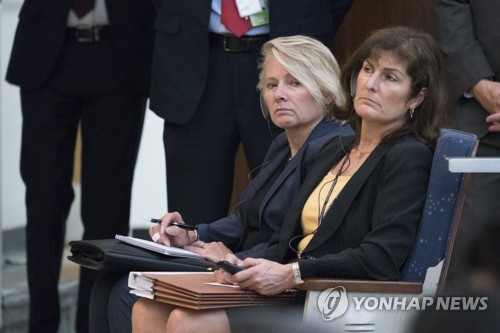The United States will achieve the denuclearization of North Korea "one way or another" even though it prefers a diplomatic solution, a top U.S. diplomat said Thursday.
Susan Thornton, nominee for assistant secretary of state for East Asian and Pacific affairs, made the remark at her confirmation hearing, appearing to reaffirm that Washington will use military options to counter the nuclear threat if necessary.
"The Trump administration has mobilized the entire international community, through our campaign of global maximum pressure, to come together to face down Kim Jong-un's attempts to develop his nuclear and ballistic missile capabilities," Thornton told the Senate Foreign Relations Committee, referring to the North Korean leader.
"Our preference is to achieve denuclearization of the Korean Peninsula through a diplomatic settlement, but we will reach this goal one way or another," she said.

The U.S. has repeatedly stated that all options are on the table to deal with the North Korean threat. Tensions heightened last year as the regime tested its sixth and most powerful nuclear weapon as well as three intercontinental ballistic missiles capable of striking the U.S.
Recent weeks also saw growing talk of the Trump administration considering a limited preventative strike on the North, dubbed the "bloody nose" strategy. A senior administration official recently told South Korean reporters such a strategy does not exist and has never been discussed.
At the hearing, two senators quoted a White House official as saying the same.
"That is my understanding, senator, yes," Thornton said.
On the missile threat, Gen. Lori Robinson, chief of the North American Aerospace Defense Command in charge of missile defense, told a separate hearing the U.S. is prepared to defeat it.
"I want to assure this committee today that I am confident that I can defend the United States," she said before the Senate Armed Services Committee. "While I'm confident that we can defeat this threat today, it is critical that we continue to improve the ballistic missile defense enterprise, with emphasis on the development of improved sensor networks, combined with interceptor capability and capacity and reliability."
Thornton called North Korea a "menacing threat" that continues to increase and poses one of the biggest security challenges in the region.
"The U.N. Security Council unanimously passed four sanctions resolutions last year, and additional worldwide efforts to further isolate North Korea diplomatically and economically make clear that we will not accept a nuclear North Korea," she said.
The nominee, who has been serving in an acting capacity since March, also underscored the administration's commitment to "fair and reciprocal market access," saying "the export-led model that underpinned East Asia's stunning growth is no longer viable."
Since joining the Foreign Service in 1991, Thornton has worked at the U.S. diplomatic missions in China, Kazakhstan and Turkmenistan, among other assignments. She was tapped by President Donald Trump in December to be the top U.S. diplomat for East Asia. (Yonhap)

